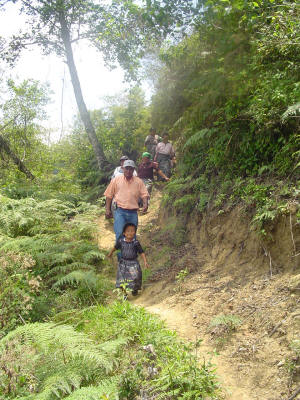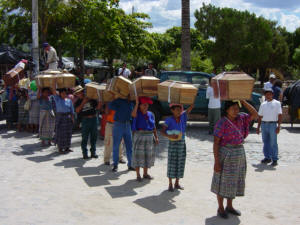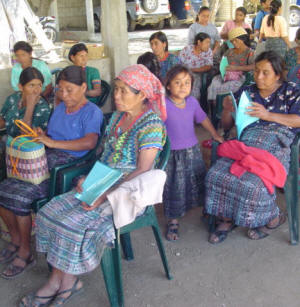Human Rights
Exhumation Accompaniment
Legal Cases
ADIVIMA was founded in 1994, as an
association of victims of the internal armed conflict in
Guatemala. The work of the association is directed
specifically to the search for solutions to the legal,
social, economic, and educational problems that confront the
survivors of the armed conflict. To be able to achieve these
objectives, ADIVIMA has designed an organizational structure
that has allowed us to create three main commissions of
work:
-
Commission for Human Rights
-
Commission for Socioeconomic
Development
-
Commission for Community
Formation, Organization, and Participation
 Commission
for Human Rights Commission
for Human Rights
1. Legal accompaniment in the cases
of grave human rights violations that occurred during the
internal armed conflict.
During the past 13 years ADIVIMA has accompanied and
supported survivors in many different human rights legal
cases that the victims of the internal conflict have brought
against the government. These include the cases of the
numerous massacres and acts of genocide that occurred in the
Maya Achí communities due to the active participation and
action of the Guatemalan National Army and Civil Defense
Patrol (PAC) squads as a part of the strategies of the
governments of Lucas García, Benedicto Lucas y Efraín Ríos
Montt.
Each of the cases must meet certain criteria, as a part of a
national legal strategy that has been implemented to
determine which cases the legal system will take. These
include an exhumation that has been properly managed and
executed under the care of forensic anthropologists and eye
witness testimonies from survivors who can both testify to
what happened and identify those directly responsible for
the crimes. Then, the next step is to infer to their
intellectual authors.
The legal and penal processes of the cases in which ADIVIMA
has accompanied have lasted more than thirteen years with
some positive results, although there are many difficulties
that exist that do not allow the goals and objectives of
these cases to be completely met. Some of these difficulties
include the use of resources by the Institute of Public
Penal Defense to prolong trials and outlast the lesser
resources of ADIVIMA, as well as the delay of the release of
legal resolutions by the Constitutional Court, which can
take up to two years.
In the case of the massacre that occurred in community of
Río Negro on March 13, 1982, which killed 107 children and
70 women, the work of ADIVIMA has sent to prison 9 PAC
members responsible for the massacres, three of which were
sentences to 50 years in prison. In 2006, during a public
forum, an order was issued to capture three more PAC members
responsible for the massacres. Although the motion was
presented before the Interamerican Commission for Human
Rights, the state has shown little will to capture or punish
the three PAC patrol men. The case against the military
detachment responsible in this situation is another
circumstance that qualifies under this paradigm. They have
also been denounced by ADIVIMA before the Public Minister
for their crimes against humanity.
Another case in which ADIVIMA accompanied was the case in
Pachalum, Baja Verapaz that was presented before the M.P. on
December 13, 2005 in order to denounce the crimes of
assassination, attempted extrajudicial killings, and crimes
against humanity that occurred there. They are trying to
achieve justice for the acts were executed by the military
and the PAC civil patrol units of Pachalum, Baja Verapaz
during 1982 against the civil society. As of today there is
an order to capture 5 of the perpetrators, two of which are
currently under arrest and in prison awaiting trial, the
other three of which are currently fugitives of the law.
There continue to exist demands from the families of the
victims to bring to justice the perpetrators in the many
other cases of massacres in Baja Verapaz and Alta Verapaz.
The case against Coronel José Antonio Solares Gonzáles, in
regards to the Río Negro massacres, was brought to the
Interamerican Commission on Human Rights over three years
ago, but the government still has failed to execute the
order for his capture and trial. As of today, ADIVIMA´s own
legal office is still responsible for each of these cases.
 2.
Social and Legal Accompaniment in the Exhumation of
Clandestine Graves 2.
Social and Legal Accompaniment in the Exhumation of
Clandestine Graves
Undertaking exhumations is a lengthy and complex process
that can last anywhere from several months to several years.
ADIVIMA works to facilitate and coordinate this process so
as to make it as simple as possible for the families of the
victims. This process involves identifying sites of
clandestine graves, gathering testimony from eyewitness
survivors, planning traditional Mayan ceremonies before the
exhumations, coordinating the efforts of the FAFG to exhume
the graves, creating a petition from information from the
forensic anthropologists, presenting the cases before the
Public Ministry, and coordinating proper funerals and burial
ceremonies with families of the victims. This long process
is important in the documentation of the events that
occurred during the internal conflict as well as to attempt
to bring a sense of peace to the families of the victims.
The work of ADIVIMA and other organizations that participate
in the exhumation process is currently funded by the UN and
other international and bi-lateral donors, through the
National Program of Repatriations. Funding for these
projects will run out after August 2007 and ADIVIMA, in
association with many other organizations, has petitioned
for funding to continue. We will not know until around
August of 2007 whether or not funding for ADIVIMA to work in
this crucial area will continue.
The lessons learned through the internal conflict have made
ADIVIMA demand access to human rights through the work of
our own organization of survivors in the more than 250
investigations and denunciations of clandestine cemeteries
in Baja Verapaz and more than 25 in Alta Verapaz. ADIVIMA
has provided legal accompaniment in 59 of the exhumations
executed in Baja Verapaz and 6 in Alta Verapaz. In 2006
alone, ADIVIMA provided accompaniment and support in more
than 14 exhumations of clandestine graves.
3. The Right to Repatriation and Vindication for the
Indigenous Communities Affected by the Construction of the
Chixoy Hydroelectric Dam
For years, we at ADIVIMA have been
fighting for reparations for the damages caused by the
creation of the Chixoy Hydroelectric Dam on the Rio Negro
River. On September 7, 2004 ADIVIMA began to accompany and
legally advise the affected communities with strategies for
negotiation and organization to lobby for the creation of a
high commission that would be able to: a) determine the
damages caused by the expropriation of land and the
displacement of people due to the Chixoy Dam, as well as
what repatriations need to be made to the victims, b)
establish a timeline and specific mechanisms to undertake
these repatriations, c) identify a financial source and
support for the allocation of the resources necessary from
the National General Budget of Guatemala. On September 18,
2006, an agreement was reached for the installation of the
commission, and was signed into law by the Vice President of
Guatemala, Eduardo Stein Barillas. As of today, ADIVIMA is
undertaking negotiations with the government concerning the
case of the Chixoy Dam repatriations. The facilitation and
mediation of this process falls under the responsibility of
the Organization of American States (OAS), the observation
of the World Bank (WB), the Interamerican Development Bank,
the Guatemalan Procurator of Human Rights, and the United
Nations Office of the High Commission on Human Rights.
In the case to resolve the petitions of the 28 indigenous
communities, nine community leaders that have been important
at the negotiation table with the government were legally
prosecuted with criminal charges in 2004. Experts believe
that these charges were politically motivated in order to
scare them away from the proceedings. The charges occurred
after a peaceful protest, at the site of the dam, for the
creation of a commission to begin the process of
repatriations to the victims. The charges included illegal
threats, illegal detainments, attacks against the security
of a public utility, and activities against the security of
the state. Among those arrested were three ADIVIMA employees
including Juan de Dios García,, Carlos Chen Osorio, and
Félix Alonso Raymundo. The legal department of ADIVIMA has
accompanied in these cases since 2004, in the defense of the
leaders, and due to their efforts the charges have recently
been dropped.
Commission for Socioeconomic
Development
Rotating Micro Credit Project
ADIVIMA has implemented a program of small rotating micro
credit opportunities for the victims of the internal
conflict that currently live in extreme poverty. These small
loans allow the families to improve their economic status
through investments in their livelihoods and to provide new
ways to generate income.
 Commission
for Community Formation, Organization, and Participation Commission
for Community Formation, Organization, and Participation
1. Project for Citizen
Participation
Rabinal was one of the municipalities most affected during
the internal armed conflict that occurred during the 1980s,
which destroyed the personal integrity of many and greatly
affected the social fabric of the area. Due to this, many
people in Rabinal are afraid to involve themselves in
participatory activities, which has debilitated the civil
society and the development of the municipality.
The majority of the inhabitants of the municipality of
Rabinal are young and this means that the municipal
government and NGOs of the area must promote and strengthen
spaces of active participation and equality to establish new
paradigms for the vision of the youth, in order to promote
social development for the future of the general population.
Due to the cultural aspect of machismo, discrimination
against women is notorious, especially in local and
community organizations as seen in the members of the second
level of the COCODES, or community governmental structures,
and the Municipal Corporation. For these reasons it is
necessary to elaborate on a strategic plan of municipal
investment to create a space of sensitivity through a
massive campaign to incorporate those usually excluded, but
who desire to become community leaders with the help of
ADIVIMA.
Also, in the past four years ADIVIMA has worked on a Minimal
Municipal Agenda for Rabinal in regards to the care and
development of women and youth who have been victims of the
internal conflict. As of now, ADIVIMA is currently keeping
its commitment to evaluate the successes and failures of the
past agenda for 2003-2007, and create a new agenda for
2008-2012.
2. Program to Provide Equipment to Schools
This program operates in the rural communities, affected by
the Chixoy Dam Project and the internal armed conflict, that
do not receive resources from the government to help provide
assets and equipment for educating their youth.
3. Program to Provide Scholarships to Young Girls
ADIVIMA´s scholarship program is
currently in development and will be directed towards
families with little resources to send their children to
school. Due to the machismo in Guatemala, ADIVIMA believes
that girls are regularly excluded from obtaining an
education, especially in these rural areas. This opportunity
for girls will provide them with an education and the
ability to return to their communities to promote social,
economic, and educational development in some of the most
depressed regions surrounding Rabinal.
|











